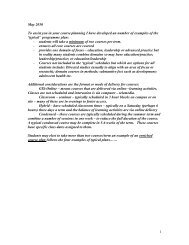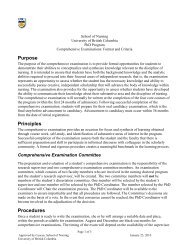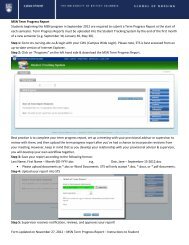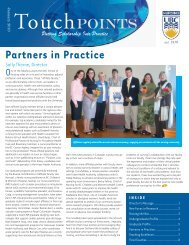Preceptor Evaluation Feedback Forms - School of Nursing
Preceptor Evaluation Feedback Forms - School of Nursing
Preceptor Evaluation Feedback Forms - School of Nursing
You also want an ePaper? Increase the reach of your titles
YUMPU automatically turns print PDFs into web optimized ePapers that Google loves.
UNIVERSITY OF BRITISH COLUMBIA SCHOOL OF NURSING<br />
<strong>Nursing</strong> 427 Consolidated Practice Experience<br />
<strong>Preceptor</strong> <strong>Evaluation</strong> <strong>of</strong> Student<br />
<strong>Preceptor</strong><br />
Student:<br />
<strong>Preceptor</strong><br />
Signature:<br />
Date:<br />
Student performance and learning are evaluated based on the UBC Program/Course Outcomes that are consistent with the CRNBC’s Standards <strong>of</strong> Practice.<br />
1. Practices within the scope <strong>of</strong> pr<strong>of</strong>essional nursing.<br />
Exemplars <strong>of</strong> student attributes<br />
1.1 Consistently applies and justifies application <strong>of</strong> the Pr<strong>of</strong>essional Standards at current level <strong>of</strong> practice.<br />
MP = Mid-point F =<br />
Final<br />
Consistent<br />
Inconsistent Not Observed<br />
MP F MP F MP F<br />
1.2 Consistently applies a variety <strong>of</strong> knowledge, skills, attitudes and judgments in providing nursing care for<br />
individuals, families, communities, and populations.<br />
1.3 Consistently demonstrates accountability and responsibility in the performance <strong>of</strong> nursing roles and<br />
responsibilities.<br />
1.4 Performs safe and effective nursing care (i.e. psychomotor, communication and use <strong>of</strong> appropriate technology).<br />
1.5 Completes all nursing care in a timely manner and in accordance with agency policies and protocols<br />
1.6 Gives and receives constructive feedback and acts on feedback to promote competence.<br />
1.7 Seeks opportunities for pr<strong>of</strong>essional growth and development<br />
1.8 Other:
2. Engages in relational practice with individuals, families, communities and populations.<br />
Exemplars <strong>of</strong> student attributes<br />
2.1 Fosters quality in relationships with all parties involved in health care encounters.<br />
MP = Mid-point F =<br />
Final<br />
Consistent<br />
Inconsistent Not Observed<br />
MP F MP F MP F<br />
2.2 Strengthens ability to engage relationally at individual, family, group and community levels.<br />
2.3 Communicates in a clear and accurate written and verbal format.<br />
2.4 Incorporates a critical inquiry and relational process to conduct organized and comprehensive assessments that<br />
emphasize client input and determinants <strong>of</strong> health.<br />
2.5 Supports clients in making informed decisions about their health care and respects those decisions.<br />
2.6 Critically examines assumptions and variables in client care situations.<br />
2.7 Recognizes and assumes responsibility for own values and beliefs and how they influence nursing care.<br />
2.8 Other:<br />
3. Uses critical inquiry in the provision <strong>of</strong> health care for individuals, families, populations, and communities.<br />
MP = Mid-point F =<br />
Final<br />
3.1 Engages in critical problem solving.<br />
Exemplars <strong>of</strong> student attributes<br />
3.2 Draws upon research evidence, experiential knowledge, knowledge from other disciplines, and nursing’s distinct<br />
disciplinary perspective to make practice decisions about the health and healthcare experience <strong>of</strong> the client<br />
3.3 Critically analyses the social context <strong>of</strong> health and health care.<br />
3.4 Applies critical thinking and systematic inquiry to support best practice in delivery <strong>of</strong> care.<br />
Consistent<br />
Inconsistent Not Observed<br />
MP F MP F MP F
3.5 Other:<br />
4. Exhibits leadership in the provision <strong>of</strong> health care for individuals, families, populations, and communities.<br />
MP = Mid-point F =<br />
Final<br />
4.1 Practices according to the ethical standards <strong>of</strong> nursing.<br />
Exemplars <strong>of</strong> student attributes<br />
4.2 Applies basic leadership and management concepts within the healthcare context<br />
4.3 Advocates for holistic, client-centered care across the health care continuum.<br />
4.4 Demonstrates awareness <strong>of</strong> basic organizational concepts, such as the organizational vision and mission, the<br />
organizational chart, and chain <strong>of</strong> command.<br />
4.5 Uses effective time management skills, such as organization and prioritization when planning and implementing<br />
care.<br />
4.6 Identifies appropriate resources, material and human, to utilize in pr<strong>of</strong>essional practice.<br />
4.7 Recognizes the importance <strong>of</strong> pr<strong>of</strong>essional and institutional policy and procedures in the delivery <strong>of</strong> health care.<br />
4.8 Other:<br />
Consistent<br />
Inconsistent Not Observed<br />
MP F MP F MP F<br />
5. Engages in inter-pr<strong>of</strong>essional practice in the provision <strong>of</strong> health care for individuals, families, populations, and communities.<br />
MP = Mid-point F =<br />
Final<br />
Exemplars <strong>of</strong> student attributes<br />
5.1 Functions in a collaborative capacity as a member <strong>of</strong> the healthcare team.<br />
Consistent<br />
Inconsistent Not Observed<br />
MP F MP F MP F
5.2 Integrates inter-agency and community resources when planning and providing care for clients.<br />
5.3 Maintains effective interpr<strong>of</strong>essional communication as part <strong>of</strong> a health care team.<br />
5.4 Utilizes pr<strong>of</strong>essional ethical and legal standards in health care decision-making.<br />
5.5 Other:
N427 <strong>Preceptor</strong> Mid-Point <strong>Evaluation</strong> <strong>of</strong> Student<br />
Student Name:<br />
Placement Site:<br />
Type <strong>of</strong> Placement:<br />
Comments:<br />
Achievements & Strengths:<br />
Areas to work on next:<br />
Clinical Absences (Number <strong>of</strong> Days/Hours missed)<br />
Days Absent Total Hours Missed Reason<br />
<strong>Preceptor</strong> Signature: _____________________________________<br />
Name <strong>of</strong> <strong>Preceptor</strong>: ______________________________________<br />
Date: ____________________
N427 <strong>Preceptor</strong> Final <strong>Evaluation</strong> <strong>of</strong> Student Competencies<br />
Student Name:<br />
Placement Site:<br />
Type <strong>of</strong> Placement:<br />
Comments:<br />
Achievements & Strengths:<br />
Areas to work on for the future:<br />
Clinical Absences (Number <strong>of</strong> Days/Hours missed)<br />
Days Absent Total Hours Missed Reason<br />
I confirm that this student:<br />
Successfully completed all <strong>of</strong> the clinical requirements for N427<br />
Has not completed the clinical requirements for N427<br />
<strong>Preceptor</strong> Signature: _____________________________________<br />
Name <strong>of</strong> <strong>Preceptor</strong>: ______________________________________<br />
Date: _____________________________
<strong>Feedback</strong>: <strong>Preceptor</strong> Perspective<br />
Please complete this evaluation <strong>of</strong> the <strong>Nursing</strong> 427 experience from your perspective as a preceptor. The completed<br />
form should be placed in a sealed envelope and signed on the seal, and returned to the faculty member at the time <strong>of</strong><br />
the final evaluation interview. Alternatively, the form may be returned to the N427 Course Leader/Coordinator by<br />
fax: 604-822-7466 or by mail: UBC <strong>School</strong> <strong>of</strong> <strong>Nursing</strong> T201-2211 Wesbrook Mall Vancouver BC V6T 2B5.<br />
Please indicate the degree to which you agree with each <strong>of</strong> the statements below by placing a checkmark in the<br />
appropriate column.<br />
1. The information I received helped me to<br />
understand the course.<br />
2. The contact with the faculty organizing the<br />
experience was useful.<br />
3. The approach used to organize the shifts the<br />
student would work was appropriate.<br />
4. General objectives about the experience were<br />
shared with me.<br />
5. Information about the student’s psychomotor<br />
skills competencies was useful.<br />
6. The student’s own objectives clarified his/her<br />
learning needs for me.<br />
7. The student was prepared for the experience.<br />
8. The faculty member was accessible to me as<br />
needed during the experience.<br />
9. The faculty member assisted with the<br />
evaluation <strong>of</strong> the student.<br />
10. If I had concerns about the student’s<br />
performance, the faculty member was available<br />
to help me.<br />
11. I would rate the overall experience as positive.<br />
Strongly<br />
Agree<br />
Agree<br />
No<br />
Opinion<br />
12. To what extent did sharing the student’s learning plan facilitate the learning process<br />
Disagree<br />
Strongly<br />
Disagree<br />
13. What was the most helpful thing the student did to facilitate the learning process<br />
14. What was the most helpful thing the faculty member did to facilitate the learning process<br />
15. What was the most helpful thing in the context <strong>of</strong> the clinical environment that facilitated the learning process<br />
Agency/Unit<br />
Student<br />
<strong>Preceptor</strong><br />
Date<br />
Thank you for your feedback, it is important to us.














